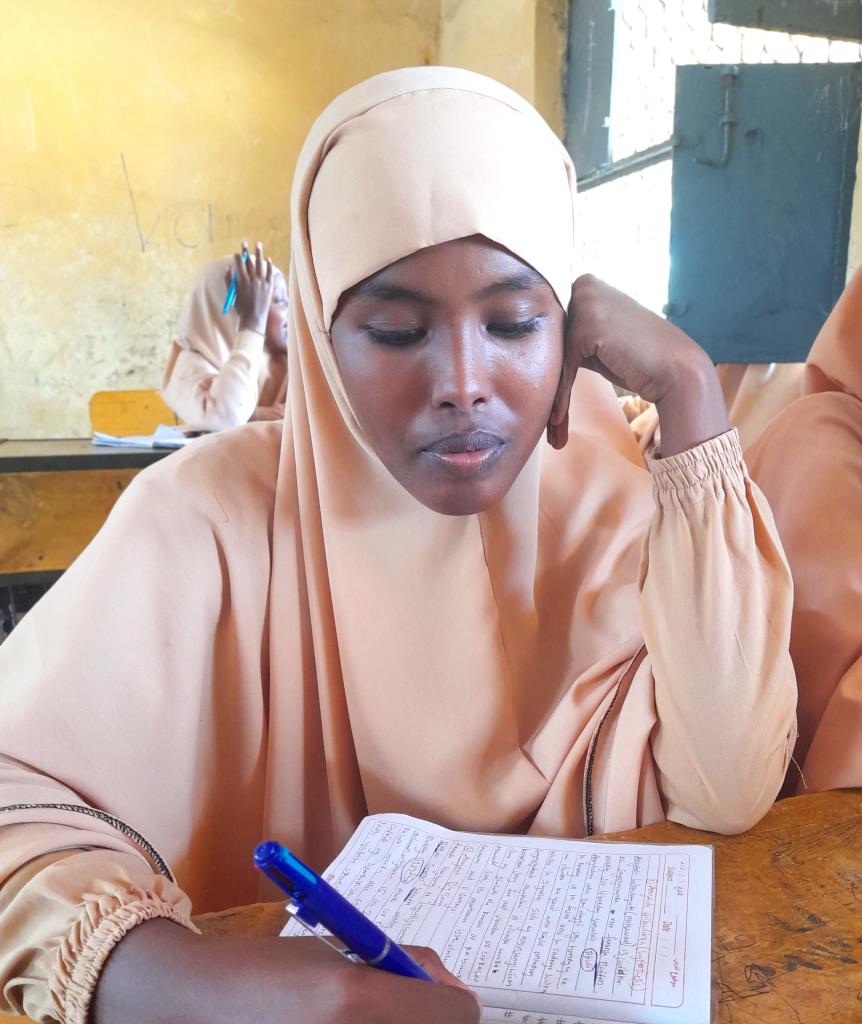Born in the town of Jilib Lower Juba of Somalia, meet Zaynab Cali Yussuf who emerged to be a symbol of resilience and hope. At her young age Zaynab’s life took a drastic turn when she and her family were displaced by conflicts and natural disasters such as drought in the year 2015. Her family has been among the hundreds of Somali families that witnessed the harsh realities of life in a conflict-ridden country.
Somalia has been in a civil war for a period of over two decades, which caused many youngsters to shut off their dreams and miss opportunities such as education and career growth. Zaynab, being among the families who were displaced every year due to insecurity and natural disaster like drought among other effects faced many challenges in her life. The displacement forced Zaynab to encounter the harsh reality of life and miss basic needs like food, access to clean water and witness significant disruption to her education.
Jilib, her hometown, was often marked by violence and instability, forcing families to live on the edge of survival. In 2015, conditions worsened dramatically, and Zeynab’s family was compelled to flee to Kismayo, a city they hoped would offer them a better life. “The first few months were difficult,” narrated Zaynab and continued by stating that, “We struggled to find food, and I often worried that I would never go back to school.” The psychological toll of displacement often manifested in anxiety and hopelessness, but Zaynab’s spirit remained unbroken.
After relocating to Kismayo, Zaynab witnessed significant disruption in education. Schools were overcrowded, and many families mostly prioritized survival over education, leading some girls to become child brides or caregivers instead of students. Zaynab’s own educational journey was stunted. For one year, she could not attend school, and the dream of becoming a doctor seemed more distant with each passing day. “I watched many of my friends drop out of school. I felt like I was losing my future,” she shared, expressing her fears of an uncertain future amid such challenging circumstances.
Zaynab later arrived at Wamo Stadium Primary and Secondary School and was lucky enough to be enrolled through ADRA Somalia’s ECHO project which had a goal of providing access to lifesaving equitable, inclusive, quality and protective education services to vulnerable girls and boys. Through the ECHO project, she received critical support that enabled her to return to school. “Thanks to the support from ADRA, I finally had the chance to go back to school,” narrated Zaynab. The project provided her with school fees, reading and writing materials easing the financial burden on her family.

Zaynab immersed herself in her studies, often staying late to study and completing extra assignments to catch up. Her hard work culminated in the most recent primary exams, where she emerged as the leading student in Juba land state for her class 8 exams. This not only filled her with pride but also inspired her younger students at Wamo Primary and Secondary School. “I can’t express how happy I was when I received my results,” Zaynab shared, her eyes shining with joy. “It showed me that if I work hard, I can achieve my dreams!” Her success story resonated throughout her community, empowering other girls to pursue their education actively.
“I want to help people in my community, especially women and children who often need it the most,” she narrated as she looks forward to being a doctor in her future. Zaynab understands the struggles her community faces and believes that education is the most powerful tool to bring about change
Zaynab became a symbol of hope for many families. Community leaders began to recognize the important role education played in development and resilience. Habiba Abdullahi ADRA’s Project Officer added that, “In many ways, Zaynab journey to success motivates many potential children in affected by displacement and other factors to pursue education since it is the key to success and therefore by investing in their education, ADRA Somalia are essentially investing in the future of Somalia.”

